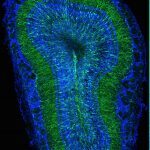Lien vers Pubmed [PMID] – 24767482
Prog. Brain Res. 2014;208:157-75
The olfactory system is a dynamic place. In mammals, not only are sensory neurons located in the sensory organ renewed through adult life, but also its first central relay is reconstructed by continuous neuronal recruitment. Despite these numerous morphological and physiological changes, olfaction is a unique sensory modality endowed with a privileged link to memory. This raises a clear conundrum; how does the olfactory system balance its neuronal turnover with its participation in long-term memory? This review concentrates on the functional aspects of adult neurogenesis, addressing how the integration of late-born neurons participates in olfactory perception and memory. After outlining the properties of adult neurogenesis in the olfactory system, and after describing their regulation by internal and environmental factors, we ask how the process of odorant perception can be influenced by constant neuronal turnover. We then explore the possible functional roles that newborn neurons might have for olfactory memory. Throughout this review, and as we concentrate almost exclusively on mammalian models, we stress the idea that adult neurogenesis is yet another form of plasticity used by the brain to copes with a constantly changing olfactory world.


